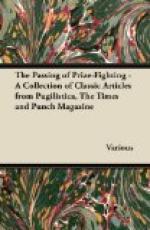* * * * *
WIRE AND BARBED WIRE.
This was the telegram that, after much hesitation, I had written out at the side desk in the post-office and carried to the main desk to despatch:—
Pactolus, London.
St. Vitus carburetter stammer tyre scream Sanguine.
You will observe that it is unintelligible. Decoded, it meant that I, whose betting pseudonym is Sanguine, wished to invest with Messrs. Lure, commission agents (not bookmakers, no, not for a moment), whose telegraphic address is “Pactolus, London,” a sum of ten pounds (carburetter) on a horse called St. Vitus to win (stammer), and twenty pounds (tyre) for a place (scream). I had done this for various reasons, none really good, but chiefly because every paper that I had opened had urged me to do so, some even going so far as to dangle a double before me with St. Vitus as one of the horses. Nearly all had described St. Vitus as a nap, setting up the name not only in capitals but with a faithful asterisk beside it.
Having an account with Messrs. Lure and a liking now and then to indulge in a little flutter over a gee (I am choosing my words very carefully) I had decided, after weighing the claims of all the other runners, to take the advice of the majority and back the favourite, although favourites acclaimed with stridency by the racing experts of the Press in unison have, I knew, a way of failing. In betting on races, however, there are two elements that are never lacking: hope against hope and an incomplete recollection of the past.
Having written out the telegram I took it to the main counter, to the section labelled “Telegrams,” and slipped it under the grating towards the young woman, who, however, instead of dealing with it, continued to tell an adjacent young woman about the arrangements that she and a friend had made for their forthcoming holidays at Herne Bay.
The nature of those who have little flutters on gees is complex. The ordinary man, having written out his telegram, on whatever subject it may be—whether it announces that he will arrive before lunch and bring his clubs with him, or that, having important business to detain him at the office, he will not be home to dinner—gets it through as soon as possible. He may be delayed by the telegraph girl’s detachment, but he would not be deterred. He would still send the telegram. But those who bet are different. They are minutely sensitive to outside occurrences; always seeking signs and interpreting them as favourable or unfavourable as the case may be; and refraining from doing anything so decisive as to call the girl to order. Their game is to be plastic under the fingers of chance; the faintest breath of dubiety can sway them. I had been in so many minds about this thirty pound bet, which I could not really afford, that there was therefore nothing for it, after waiting the two minutes that seemed to be ten, but to tear up the message, in the belief that the friendly gods again had intervened. For luck is as much an affair of refraining as of rushing in.




